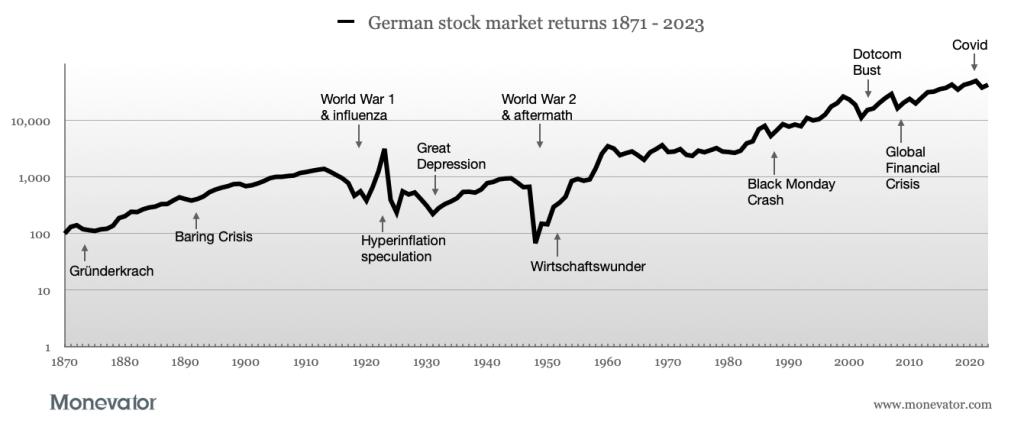
What caught my eye this week.
Things are looking up for investors. Not because the markets have got off to a strong start in 2023 – the gains logged so far could reverse in a day – but because the pain of 2022 has set the stage for higher future returns.
This is often overlooked during a bear market, probably because those paying the most attention have already invested a decent sum of money. It hurts to see it hammered.
In contrast, those 20- and even 30-somethings who most benefit from the falls have often yet to realize they need to invest for the future. And they aren’t paying attention!
Or, if they are putting money into a workplace pension or similar, for many the sums at stake won’t seem life-altering or worth the headspace.
But those of us who understand compound interest know better.
Let’s say a 30-year old has amassed £50,000 in global equity tracker funds across their tax-efficient pensions and ISAs.
Assuming the future looks like the past in terms of returns, say 8% annualized, their pot might compound to around half a million pounds after 30 years – with no further contributions.
Perhaps if you told them that their future self had a future half a million quid on the line, gyrating with the markets whims during 2022, they’d have been more interested?
Probably best you didn’t.
I get knocked down, but I get up again
Back to 2022, and recall that those who can save meaningful money typically do so throughout their lives.
Let’s assume for the sake of simplicity that our young-ish saver adds another £5,000 every year to their initial £50,000 pot from age 30.
At the same rate of return, adding £5,000 a year, they should end up a millionaire by 60.
(Yes, a million will be worth a lot less in 2052, due to inflation. Trust me you’d still rather have it.)
In this case they’d already saved £50,000 by age 30. But over the next 30 years they’ll save and invest another £150,000 in our simplified illustration.1 Most of their earnings and savings are ahead of them.
For anyone in this position, market falls are good news. They lower the price of new purchases. Which in turn improves the odds of higher future returns.
Let’s assume the 30 years of £5,000-a-year saving came after a 20% bear market that took their initial pot down to £40,000 – but that future returns would afterwards be 1% higher. In this case they would end up around 14% better off than if the bear market had never happened.
Again, all very over-simplified. Some mathematically inclined readers are cross I’m using arithmetic returns and a compound interest calculator, others that I’m not belabouring sequence of returns risk, that I’m suggesting that a mere 20% correction would juice returns for three decades, or that I’ve talking about nominal rather than real returns.
Yes yes. This is a friendly illustration you can enjoy with a cup of coffee on a Saturday morning, not a dissertation. Besides, even if I wrote 5,000 words it wouldn’t change the point.
Which is that falling prices are good when you’re putting more new money to work – whether you’re buying a house, a hamburger, or another dollop of your fav index tracker.
Vanguard expected returns
So what kind of future returns can we expect from here?
Nobody knows in the short-term, but industrial-strength modelling can give credible ranges of probability over longer time frames.
Which is exactly what fund behemoth Vanguard has done for equities:
And also for bonds:
Sorry about all the small print clutter but it seemed best to include it – you know what giant corporations are like.
Remember too that these are expected returns, within ranges of probability. Note the outliers. Nothing is certain.
With all that said, these expected returns are much higher than what Vanguard was forecasting a year or two ago. Especially for fixed income.
Tubthumping
I doubt that after a terrible couple of years for bonds, the average investor would think that UK gilts are likely to deliver 4.3% a year over the next decade?
No, but as I wrote last November, bonds actually got more attractive – not less – thanks to the sell-off.
Again, these are all nominal returns. For sure if you believe inflation is going to stay above 10% for the next few years then you shouldn’t touch bonds with a barge pole.
However me and more importantly most economists think we’ll be back down around the Bank of England’s 2% target in a couple of years, if not before.
Enjoy that thought, the other links below – and the weekend!
p.s. Want more expected returns? GMO did a good job calling the 2021 exuberance. Here’s its new forecasts [PDF]. Note these are real returns this time.
From Monevator
Asset allocation quilt: winners and losers of the past ten years – Monevator
FIRE-side chat: retiring early to travel the world in a motorhome – Monevator
From the archive-ator: How would you spend and save if you knew exactly when you were going to die? – Monevator
News
Note: Some links are Google search results – in PC/desktop view click through to read the article. Try privacy/incognito mode to avoid cookies. Consider subscribing to sites you visit a lot.
Rents rising at the fastest pace for seven years – BBC
Cost of a ‘basic’ lifestyle soars almost 20% as inflation hits poorer pensioners – This Is Money
Student maintenance loans to rise by just 2.8% next year – Guardian
HMRC to clamp down on tax refund firms with shady practices – Which
BOE made £3.5bn profit on its emergency bond-buying programme – Professional Pensions
Baillie Gifford admits ‘humbling year’ after $14bn loss on Tesla and Shopify [Search result] – FT
Smart products are abandoned by big brands after as little as two years – Which
JPMorgan shutters website it paid $175 million for, accuses founder of inventing accounts – CNBC
The desire of EU citizens to quit the bloc has shrunk since Brexit – Guardian
Products and services
Get back into the savings switching habit as interest rates surpass 4% – Guardian
The bank of mum and dad mortgages – Yahoo Finance
Special offer Attention stockpickers! The Motley Fool is offering £50-off a year’s subscription to its Share Advisor service, with a 30-day subscription refund guarantee. Terms apply – The Motley Fool
Switching can slash mobile, broadband, and pay TV bills by £250 – Which
AirBnB urges lenders to allow mortgage holders to officially rent out rooms – This Is Money
Open a SIPP with Interactive Investor and pay no SIPP fee for six months. Terms apply – Interactive Investor
Homes for sale in UK financial districts, in pictures – Guardian
Comment and opinion
Hard-learned lessons – Humble Dollar
You won’t detect the next fraud – Ted Seides
The art and science of spending money – Morgan Housel
The CGT regime needs root and branch reform [Search result] – FT
How do [US] stocks, bonds, and the 60/40 perform after big down years? – AWOCS
Tim Harford: what economists get wrong about personal finance [Search result] – FT
Are falling interest rates responsible for stock market growth? – Of Dollars and Data
Too trusting – Humble Dollar
Who do so many investors believe they’re above average? – The Evidence-based Investor
A brief history of London’s Big Bang [Podcast] – A Long Time In Finance
Crypt o’ crypto
The complicated battle for control of the massive Grayscale Bitcoin Trust – Blockworks
Bitcoin back above $19,000 on cooling inflation – CNBC
Naughty corner: Active antics
Finding value amid the discounted investment trusts [PDF] – Numis via RIT Capital
Do active funds need a new fee model? – Behavioural Investment
Terry Smith’s annual letter to Fundsmith investors [PDF] – Fundsmith
How to get the most out of an annual report [Search result] – FT
Beating the UK stock market indices in ten hours a year – Lewis Robinson
Cliff Asness on FTX, hedge funds, and the value spread [Podcast] – Infinite Loops
Tesla: a stock for our times – Morningstar
Cathie Wood: what the market overlooked in 2022 – Ark Invest
Is the golden age of biotech stocks over? – Stat
Kindle book bargains
What Should I Do With My Life? by Po Bronson – £0.99 on Kindle
The Investment Trusts Handbook 2023 by Jonathan Davis et al – Free on Kindle
Stuffocation: Living More With Less by James Wallman – £0.99 on Kindle
Factfulness: Ten Reasons…Why Things Are Better Than You Think by Hans Rosling – £0.99 on Kindle
Environmental factors
Digital traders want to go fish – Wired
US government approves world’s first vaccine for honeybees – Guardian
An Australian park brings back rats – Hakai
Ozone layer slowly mending, will be healed by 2066 – NBC News
Off our beat
Key insights from the longest-running study on happiness [Podcast] – Art of Manliness
The last thing Britain needs right now is Rees-Mogg’s ‘Brexit Freedoms’ Bill – Prospect
“Truly a renaissance of social media hot takes”: how US state agencies got funny – Guardian
Global cities ranked by number of millionaires [Infographic] – Visual Capitalist
Are our brains wired to ‘quiet quit’? – Harvard Business Review
AI and the big five tech companies – Stratechery
The truth behind ten of the biggest health beliefs – Guardian
Why do kids hate music lessons? – The Walrus
And finally…
“To build wealth it didn’t matter when you bought U.S. stocks, just that you bought them and kept buying them. It didn’t matter if valuations were high or low. It didn’t matter if you were in a bull market or a bear market. All that mattered was that you kept buying.”
– Nick Maggiulli, Just Keep Buying
Like these links? Subscribe to get them every Friday! Note this article includes affiliate links, such as from Amazon and Interactive Investor. We may be compensated if you pursue these offers, but that will not affect the price you pay.
In practice the amount they save would usually rise at least with inflation, and often far more with raises.
The post Weekend reading: these Vanguard expected returns remind us it’s darkest before the dawn appeared first on Monevator.



